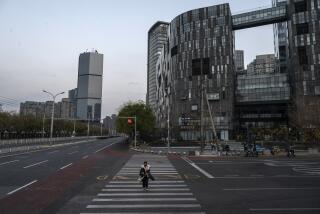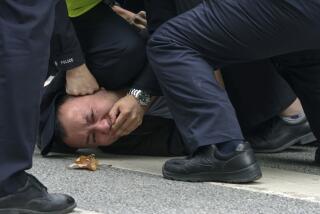Culture : Dueling Cults in China : Mao and Deng symbolize ideological purity versus capitalist-tinged reform in the Communist nation’s latest political wars. Deng’s failing health and a Maoist anniversary add urgency to the debate.
- Share via
BEIJING — On the express train between Hong Kong and Guangzhou in China’s economically booming south, teams of saleswomen push trolleys down the aisles hawking memorabilia of the late Chairman Mao, all tied to the coming centenary of his birth in Hunan province.
One of the items offered on a recent trip was a gold-plated $300 pocket watch featuring a portrait of the Chinese leader, who died in 1976. Flip open the lid, and the watch plays the tune to the old Maoist anthem with the famous lyrics:
The East is Red.
The sun is rising.
And in China, there is Mao Tse-tung.
Meanwhile, here in the Chinese capital, senior Communist Party leaders recently ordered meetings for party officials to study the theories of China’s 89-year-old paramount leader, Deng Xiaoping. Suddenly, television screens all over China were illuminated with images of stern-faced officials poring intently over the pages of the “Selected Works of Deng Xiaoping, Volume III,” released here earlier this month with great fanfare.
As the Dec. 26 centenary celebration for the birth of Mao approaches and the health of contemporary leader Deng continues to fail, China finds itself locked in a battle of dueling personality cults. Although they once fought side by side as revolutionaries, Mao and Deng, the two most important Communist Chinese leaders, have come to represent the two poles of political life here--ideological purity vs. economic reform borrowing capitalist principles.
After finally overcoming rivals including the Gang of Four, headed by Mao’s wife Jiang Qing, in the 1970s, Deng repeatedly said he opposed the idea of a “cult of personality” like the one that surrounded Mao. “Leaders should be regarded as human beings, not demigods,” he said in a 1979 speech.
But facing the prospect of a bitter succession battle after his death, Deng’s supporters, led by his two daughters Deng Rong and Deng Nan, felt they needed to do something to assure a smooth transition. The younger daughter, Deng Rong, wrote a fawning biography of her father that came out last summer and still dominates government bookstore windows.
Many here have interpreted the successive release of the daughter’s biography and the third, and presumably final, volume of Deng’s writings as a sign that Deng’s health has taken a turn for the worse.
Although he no longer holds any official position in the government--his only remaining title is chairman of the All-China Bridge Assn.--Deng remains the unquestioned power behind the scenes.
“All roads still lead to Deng,” said American author and Beijing resident William Hinton.
In a recent report of the Communist Party Central Committee here, Deng was mentioned six times while Jiang Zemin, president of China and general secretary of the party, was mentioned only once.
Historically, changes in leaders--Qing Dynasty emperors and Communist Party general secretaries alike--have been volatile and dangerous times in China.
“It is quite clear,” said UCLA political science professor Richard Baum, author of a coming book on the Deng era, “that this current flurry of hagiography is designed to provide a theoretical umbrella for Deng’s successors to continue his policies. Deng is the cement that holds the system together. The fear of chaos is ever present in China.”
Central to the Deng cultism are the diminutive leader’s elliptical pronouncements on market socialism--his theory of how to lead China in the modern world through a unique combination of Communist central authority and free-market spontaneity.
Hinton, a specialist on Chinese agriculture who takes the Mao side in the debate, commented: “Deng represents a whole class of people whose future depends on carrying through the free-market capitalism for which Deng is the symbol.’
The mounting homage to Deng is such that Willy Wo-Lap Lam, chief China political analyst for the Hong Kong-based South China Morning Post, has dubbed Deng “The New Helmsman,” a play on Mao’s old title of “The Great Helmsman.”
On the other side of the ideological divide is residual Maoism in the military and in rural areas. “In the countryside,” said Hinton, “Mao is still looked up to and revered. The Chinese expression is that Mao created heaven, now Deng is using it up.”
However, the biggest fear among Deng supporters is not a return to Maoism but rather that the centenary of Mao’s birth could be used by opposition forces or the disgruntled peasants or workers to mount a campaign against the government.
Although the Deng-inspired market reforms have brought great prosperity to some areas of China, particularly on the coast, they have also caused hardships in others.
Sichuan province was jolted last summer by demonstrations of angry farmers who had been paid in government IOUs rather than cash. Factories in the north have had increasing labor unrest. Employees in state-owned enterprises have come to learn that guaranteed jobs, wages and housing the so-called “iron rice bowl” of past days--are no longer assured in the Deng age.
“There is a lot of unhappiness around,” said Baum. “The centenary could be an occasion for a metastasis of discontent, where people who are frustrated might take protection under a Maoist banner.”
So far, plans for the centenary celebration have consisted of a proliferation of Mao trinkets and keepsakes and a very tightly controlled government schedule for official commemorative events.
Newspapers reported recently that explorers had discovered two mountains in Liaoning province that resemble Mao in appearance. The Chinese space agency sent a diamond-studded Mao centenary medallion into space on a satellite--only to have it tumble down somewhere over Peru.
Novelty companies have produced tons of kitschy mementos featuring Mao on the Long March, Mao delivering his 1949 “China Has Stood Up” speech at Tian An Men Square, Mao with the late Chou En-lai and Mao in his final resting place, in the hulking concrete mausoleum in Tian An Men.
Some of the Mao items are extraordinarily expensive by Chinese standards. Several shops in Beijing are offering 18-karat gold Mao commemorative coins decorated with South African diamonds for up to $10,000. A Shanghai company produced a limited edition, numbered Mao watch that sells for $500--especially auspicious numbers, such as 0100, sell for as much as $35,000, according to China Youth News.
Government acknowledgment of the centenary, however, has been much more low-key.
In Hunan province, site of the official celebration, the committee in charge distributed a circular banning all “non-official merchandise and activities.
“A grand provincial rally will be solemnly held,” the circular reported. “A small quantity of souvenirs are to be manufactured and issued for the occasion.”
Meanwhile, a number of senior and retired party officials have issued statements warning of the “excessive” nature of the planned centenary and reminding people of Mao’s mistakes. Deng once said that Mao made 70% good decisions and 30% bad.
“Some individuals,” warned Wan Li, retired chairman of the National People’s Congress recently, “have tried their best to create a Mao Tse-tung fever . . . to negate Deng Xiaoping’s theory on running the country.”
More to Read
Sign up for Essential California
The most important California stories and recommendations in your inbox every morning.
You may occasionally receive promotional content from the Los Angeles Times.













